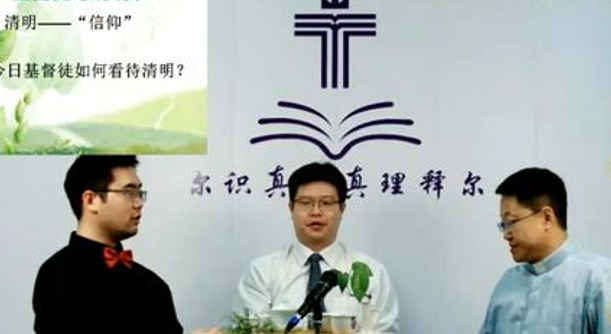A church in China’s northern Shanxi Province held an online interview on "Christians and Tomb Sweeping Festival" between three pastors in the form of a tea party.
Rev. Huang Hailin of Yaodu District Church in Linfen City on March 31 introduced the custom of "Tianshe" (sacrifice to the God of the land) in his hometown in China’s northwestern Qinghai Province during the Qingming Festival which falls on April 5 this year. Later, Pastor Wang Shuai talked about the tradition of ancestor worship in Shanxi based on his own life experiences, pointing out the differences between the southern and northern areas of the province.
Afterward, Pastor Guo Lingquan shared the history of the Qingming Festival (or Tomb Sweeping Day) and the origin of the Cold Food Festival, citing the allusions of Jin nobleman Jie Zitui and Duke Wen of Jin.
Then these three pastors discussed ancestor worship and filial piety in the Bible. By discussing the three topics of "fear of ghosts", "pray for the shelter of ancestors" and "the inheritance of Confucian filial piety culture", Rev. Huang explained the history of ancestor veneration in China, as well as the interpretation of the spirit in the Bible and the teaching of Jesus and apostles on honoring our parents.
Two of these pastors said the Bible mentions many times that people sacrificed offerings to God and that the object of sacrificial worship is God. However, tomb sweeping in China is only to express respect and yearning for the deceased ancestors through offering sacrifices and sweeping. They stated it was due to cultural differences, not referring to religious properties in an objective sense.
Then, focusing on the theme of "cultural diversity", looking back on the introduction of Christianity into China, they shared the Chinese Rites Controversy between missionaries and the domestic ruling class during the Ming and Qing Dynasties, encouraging contemporary Christians to explore a path of harmony and communion in the integration of religion and culture.
At the same time, these pastors also offered some practical suggestions, such as presenting flowers and bowing and revising genealogy to inspire younger generations by their ancestors’ deeds. They said these things were what Christians could do and what they were encouraged to do.
In the end, two pastors hoped that while remembering their ancestors, Christians could be grateful for the resurrection of Jesus with prayers for their spiritual revival, as Easter comes 12 days after Tomb Sweeping Day.
Tomb Sweeping Day originated from the Cold Food Festival (or Smoke-Banning Day) which falls on April 3-5 this year. The Cold Food Festival developed from the commemoration of the death of Jie Zitui who was loyal to the Duke Wen of Jin(born Chong’er) in the 7th century BC. During Chong’er’s 19 years of exile, Jie followed the prince, even cutting off the flesh from his thigh to make soup for Chong’er.
After the Duke of Jin was reinstated as King, he remembered that he promised a great reward to Jie who had retired to Mount Mian with his mother. Without finding him in the forests, the duke let someone set a forest fire to force them out after listening to his advisors, leaving the two people to burn to death inside the mountain.
In order to commemorate Jie, Duke Wen of Jin ordered a period of the prohibition against fire even when people cook food around the Qingming Solar term. But ancestral veneration overshadowed the stories of JieZhitui, so most people only observe Qingming Festival now, according to Wikipedia.
- Translated by Abigail Wu












